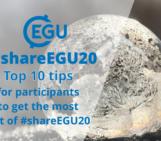
Conveners at #vEGU21 are just as important as they are during the physical meeting in Vienna! You can participate with the presenters in your session both by commenting on uploaded display materials and by facilitating the live vPICOs with the breakout author text-chats. But whilst many of you will be familiar with effective methods of engaging with people in person at a physical conference, you might feel nervous about engaging with people successfully online.
First things first: don’t worry! We have selected our ‘Top 10 Tips’ to help you manage digital interactions during #vEGU21 and also provided links to additional resources for those who want to delve in further. We also know there are a wealth of resources out there, so if you have additional tips or advice, please add them in the comments below.
Top 10 Tips for promoting good engagement at #vEGU21:
- Have a session plan: check through your list of abstract authors. Take look through the display materials already uploaded and make sure you are familiar with the sequence of topics and speakers.
- Contact your authors to remind them about the 2 minute summary Live Presentations: if you want to, you can contact your authors to remind them to upload the single summary slide for the Live Presentation, as well as their longer, more detailed Display materials. Advise abstract authors to keep their Live Presentation summaries short; with one central point to start the discussion in their chats.
- Work with your Conference Assistant on the day: your Conference Assistant is there to help facilitate your session, they will co-ordinate the single image vPICO Live Presentation slides and any pre-recorded videos submitted by speakers who can no longer present live. They will also open the author text chat sessions.
- Set the expectations: At the start of your session, be sure to briefly mention which topics you will be discussing and re-emphasise the structure of the vPICO: each Live Presentation is 2 minutes long and after all the Live Presentations are over authors will be moved into individual text chats. Also encourage your authors to share information about how to reach them outside of the vPICO so people can continue the discussion later.
- Try to prepare some questions for the author text chats: If you can, try to have at least one question ready for each presenter. Even if someone hasn’t added display materials, you should assume everyone will participate and you will be able to check if any authors don’t have an audience in their text chats when they are first moved into them. Try to share this workload with your fellow conveners and even your authors and other interested people.
- Have a general topic of discussion in mind for the main session room: your main session room video chat will stay open whilst the authors are in their individual text chat rooms, so if you want to stay in it, have an idea for a discussion relevant to the whole session that you could have whilst the individual chats are happening.
- Let the discussion flow naturally: don’t feel like you MUST drive discussions. Sometimes it is better just to sit back and let the interactions flow.
- Provide closure: Plan an exit strategy: when all the discussions have finished, or your time is running short, perhaps you could have a plan for how to end the session on a high note?
- Zero-tolerance for abuse: as a convener, it is your responsibility to protect the authors and participants in your chat from disruptions or abuse, just as you would during the physical General Assembly in Vienna. More information is available about procedures for dealing with this on the www.egu21.eu website.
- Double the fun: If you are a convener, ensure that you have at least one other person helping you serve as a moderator. This is important for identifying and dealing with any abusive or disruptive behaviour as well as giving you more time to enjoy the session.
If you are concerned about the number of people participating in a chat, don’t forget the 1-9-90 rule of online interaction (1% of people create, 9% interact, 90% lurk). There are probably more people engaged than you can see commenting or in the chats, so don’t worry and enjoy the interaction with the people who are participating.
Worried about managing abusive behaviour?
Abusive behaviour (trolling, harassment and, in general, not following the EGU’s Code of Conduct) WILL NOT BE TOLERATED on our platforms. More information on the procedures for reporting and removal of those who do not follow these guidelines is available on the www.egu21.eu website.
If you are still feeling nervous about the author text chats, why not check out something with a somewhat similar format like twitter chats! These are large, open access chats hosted in the open platform of Twitter and focussed around a central idea or speaker. It can be a good way of picking up some methods of interacting online in this way and still having fun.
We are so much looking forward to seeing all of you online, discussing your research in an open and constructive way. For more information about comments and chats, please see the resources listed below.
Tune in next week for tips for participants of #vEGU21!
Useful links:
This is a long read, but an excellent resource about moderating comments:
Resources for content design:
https://elearningindustry.com/enhance-online-training-experience-learners
https://www.participate.com/blog/building-community-in-a-time-of-coronavirus




